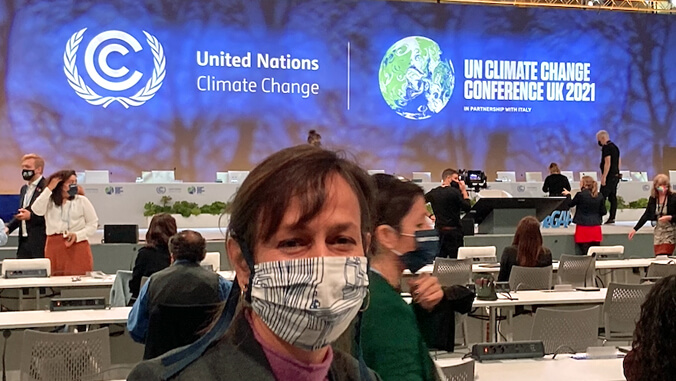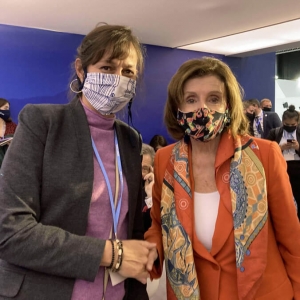
Hurricanes. Floods. Rising sea levels. No matter where you look, extreme weather events are impacting nations at an alarming rate. And in Hawaiʻi, an island state surrounded by the vast Pacific Ocean, the impacts of climate change are of increasing concern. Fortunately, Hawaiʻi has a voice at the 2021 United Nations Climate Change Conference (COP26) in Glasgow, Scotland, United Kingdom.
Marina Karides, a professor in the Department of Geography and Environment in the College of Social Sciences at the University of Hawaiʻi at Mānoa, served as an official observer from the American Association of Geographers (AAG). In this capacity, she was actively involved in the discussions and exchanging insights with other conference participants.
“We’re thrilled to have a Department of Geography and Environment faculty member representing the university and the state at this globally significant event. By participating in COP26, Professor Karides is able to take the perspectives of Hawaiʻi residents directly to the delegates making the decisions about the future of the planet. When she returns to UH, she will be able to bring the lessons she learns at the convention into the classroom to benefit students,” said Reece Jones, professor of geography and department chair.

AAG is the largest association of geographers in the world, with more than 10,000 members from more than 100 countries. On November 9, Karides participated in the Gender Day event on Advancing Gender Equality in Climate Action. In addition to scientists and activists, the session was attended by politicians including U.S. Rep. Alexandria Ocasio-Cortez and Speaker of the House Nancy Pelosi.
“The climate and ecological crisis are global and gendered phenomena. My goal at COP26 is to involve myself in events and meetings to identify how these matters were being addressed and what kind of economic strategies were being considered to shift from fossil fuels and the logic of accumulation. My students and I in GEO/PACS 333 Islands & Archipelagos will be starting our unit on island and climate change in the upcoming weeks. I can now share with them real world experiences of small island developing states and hopefully inspire some of them to participate in global and international NGOs and the UN,” said Karides.
Karides’ research centers on transnational feminisms, island studies, global social movements and economic alternatives. It includes the study of island societies, particularly how gender, race, ethnicity and sexuality are shaped by islands. She is interested in alternative economic models that serve social needs and the natural environment better than dominant economic modes.
This work is an example of UH Mānoa’s goals of Building a Sustainable and Resilient Campus Environment: Within the Global Sustainability and Climate Resilience Movement (PDF), Excellence in Research: Advancing the Research and Creative Work Enterprise (PDF) and Enhancing Student Success (PDF) three of four goals identified in the 2015–25 Strategic Plan (PDF), updated in December 2020.

